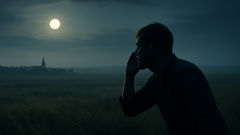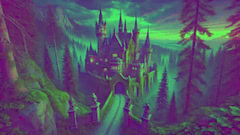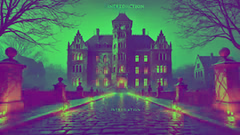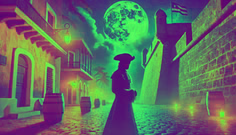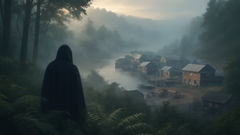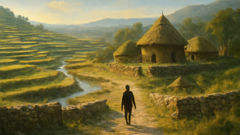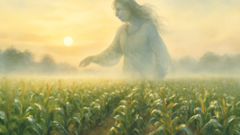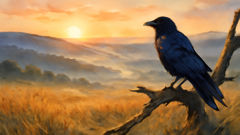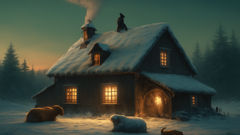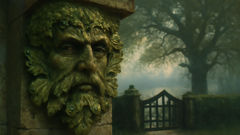Introduction
On the endless plains of Los Llanos, where grass sways with a patient, almost melancholy rhythm and the river wears the memory of every season, there is a legend that travels like a stray wind—the legend of El Silbón, the Whistler. This is not merely a ghost story told to frighten children after sundown; it is a memory etched into the land itself, a confession whispered by reed and water, a warning about pride, violence, and the fragile bond between a father and a son. The Llanos teach with patience: they show how a small tilt of a human heart can topple a life, how a single act of anger can ripple across generations, and how the wind can become a voice if you stand long enough in its lick of cold. If you listen closely, the whistle that has become El Silbón’s signature appears not as music but as a measured heartbeat—the tempo of a life broken and then tried again by sorrow. The story begins with a boy whose laughter could drown out the world, a family who believed in hard work more than mercy, and a warning that would not stay buried in a shallow grave. This introduction seeks to ground you in the landscape—the burning sun that bleaches bone, the muddy channels that swallow footsteps, the distant thunder that speaks in a language worn smooth by rain. It asks you to walk slowly, to keep your ear tuned to the wind, and to remember that in this land, every sound has a weight, every shadow a history, and every legend a responsibility. The tale that follows is a map and a mirror: it shows how the living can become echoes, and how the echo can command the land to listen back, again and again, until mercy finds a path through the music of the wind.
Section I: The Birth of the Whistle
The tale begins with a family settled along a muddy river bend, where cattle trample the wet grasses and the air tastes of wet clay and distant rain. A boy named Cayo grows tall too fast, wild in his laughter and quick with a snarl when the world does not bend to his will. The father, a quiet man who measures risk by the size of a wheel of corn and the weight of a workday, sees in his son a spark that could become a flame—or a wildfire that consumes what remains of a fragile peace. The mother, who threads prayers like needlework and tucks hope into the corners of a small home, begs for gentleness, for the kind of pride that does not topple a house from its hinges. Yet pride, once kindled, travels faster than the wind that crosses the plains. A night comes when hunger and temper collide. A stumble at the riverbank, a harsh word spoken in anger, a strike born of fear, and then the silence that follows a cry. The boy’s powerover his own anger becomes the first instrument of his ruin, and in a moment, he has taken a life that cannot be replaced—his own father, fallen not by a blade but by a storm of words that turned into deeds. The body is laid to rest in the earth, but not before the boy, in a ritual of fear and awe, seizes the sack that will cradle his guilt—the sack that will cradle the bones of the man who shaped him, the bones that will come to rattle like dry sticks in the wind. The mother’s hands tremble, because she knows what this means: a pact sealed with blood, a future written in whispers. The father’s bones, carried in a rough-hewn sack, become the burden that walks beside the son—a burden the son decides to bear not out of restitution but to tame the guilt that gnaws at night. As the village breathes and the river sighs, the man’s name disappears into the gnarled branches of the forest and the memory of a cruel act sinks into the earth, where it will wait to be confronted by the living. From that night, the boy’s face changes from bright arrogance to something aging early, the eyes dulling with the knowledge that the wind has begun to listen to his secrets and, in turn, to appoint him a warden. The tale moves through the whispers of elders, who speak of a curse that does not end with a single prayer but multiplies with each act of violence. The boy—now a son who has become more symbol than flesh—finds the whistle within the hollow of his own fear, a call that echoes through the reeds and across the still water, a sound that will never truly belong to him alone. The legend takes form not as a sharp scream but as a long, breathy note that travels, unbroken, from one hill to the next, until the entire Llanos holds its breath. In this dawn of the Whistle, the land knows that a father’s bones are a map, and a son’s rage is the path that must be walked again and again, until someone learns mercy, or the mercy itself becomes a haunting.
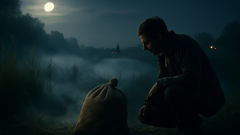
Section II: The Whistler’s Walk
From that night onward, the plains become a partner and judge to the boy who is now widely known as El Silbón. The wind carries a voice that is both his and not his, a whistle that seems to rise from the weight of bones rather than from lungs. Travelers who stride along the dirt roads at dusk sense a chill that travels to their bones, a breath that is not theirs, a sound that makes hairs rise and palms sweat. They begin to learn to listen for the exact moment when the whistle fractures into cadence—the rhythm of someone counting the heartbeat of the land, the pace of a life measured against the horizon. El Silbón appears as a silhouette, a figure that seems to drift more than walk, a shadow that clatters with the sound of something heavy moving beneath his cloak. He wears the bones of his father like a relic, a bag that swings from his shoulder with a bone-chime that accompanies the wind. Some say the bones are not merely bones but a living map—an archive of every wrong the boy committed and every life he touched with violence, a ledger that the wind obliges him to carry until the debt is paid. The Whistler’s journey is punctuated by moments when the whistle’s tone rises and falls, a musical lament that marks the road between fear and pity. In a village where lanterns burn late into the night, a mother’s prayer meets a child’s curiosity, a hunter’s patience meets a ghost’s demand. The Whistler will not let a field go quiet; he must test the courage of those who would ignore the old legends, to remind them that the land does not forget. The encounters range from a weary muleteer who swearsthe whistle is a mercy only when it coughs out a song of mercy, to a nurse in a distant outpost who learns from a dying man that mercy can redeem even a wandering wraith if properly addressed. The Strict Law of the Llanos—survival, memory, and respect for the living and dead—becomes the moral compass that the Whistler both defies and embodies. Yet even as fear travels ahead of him like a weather front, the quiet voice of an older man—a local shaman and guide—suggests a counter-narrative: that mercy is double-edged, that the living must learn to honor the dead not out of fear but out of love, to stop the cycle that keeps the Whistler in motion. The plains themselves, vast and patient, absorb the echoes of his steps and keep faith with the old memory: the son’s rage, the father’s bones, the warning note of the whistle, and the costly, fragile possibility that forgiveness might pause the endless wind for a single night.
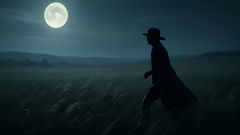
Conclusion
The Llanos keep faith with the old voice: that every action leaves a trace that can travel as far as the wind will carry it. El Silbón remains a figure in the margins of the night, a lesson that violence breeds only more violence and that mercy, once offered, binds a story to the living world rather than releasing it to drift endlessly in the dark. Some nights, when the wind is soft and the grass lies still, a traveler might hear the faint cadence of a whistle and feel a weight in the chest, a reminder that the living must choose whether to learn from a tale of sorrow or to let it become a tyranny of fear. The bones, still carried, still clatter with each step, not as a boast but as a memory that demands care. The legend does not pretend to end with merely a scream or a sigh; it asks for reflection, for a reckoning with pride, and for an act of mercy that could slow the endless walk of a man who has learned too much about loss. If you walk these plains with a listening heart, you may hear a whisper from the bones themselves—an invitation to remember and to forgive. And perhaps, in listening, you will find a path that leads the Whistler back toward rest, or at least toward a moment of quiet where the wind no longer sounds like a summons but like a witness to a life that could have chosen mercy instead of ruin.

